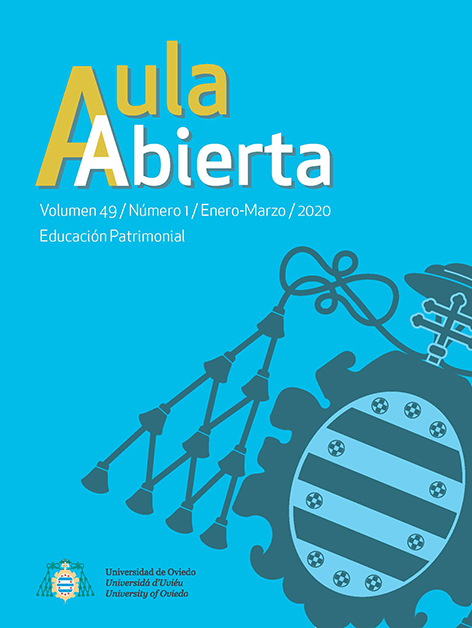Abstract
This paper presents an evaluation of an educational project based on the sense of identification with the immaterial cultural heritage of a school located in a rural community. The learning process of schoolchildren regarding the traditional carnival of the Ulla district (A Coruña) was analysed. The extent to which the project had an impact on the community and the process of the pupils’ identification with the traditions of their surrounding area was assessed. The experiment was performed outside of school hours and forms part of a broader project which began in 2016. The aim was to promote the construction of an inclusive identity in a rural community via the use of aspects of the local cultural heritage and intergenerational dialogue. In order to achieve this, the involvement of the community with the school was essential. Forty-four pupils of primary and secondary ages and 22 local adults participated in the experiment. Questionnaires and registers of the participants’ observations were used to gather data. The results show the importance and effectiveness of learning communities which transcend work carried out in the classroom. Teachers lack the incentive to become involved in such projects due to the fact that the workload and the extra effort required by such activities is not recognised or supported by the administration. However, the limited involvement of teachers was counteracted, to a large extent, by the collaboration of the local community.
Key words: Project evaluation, Heritage education, Place-based education, Rural community, Intergenerational dialogue
References
Barraza, L. y Castaño, C. (2012). ¿Puede la enseñanza de la ciencia ayudar a construir una sociedad sostenible?. Profesorado. Revista de Currículum y Formación del Profesorado, 16(2), 45-58.
Bisquerra Alzina, R. (1989). Métodos de investigación educativa. Guía práctica. Barcelona: CEAC.
Buendía, L.; Colás, P. y Hernández, F. (1998): Métodos de investigación en psicopedagogía. Madrid: McGraw-Hill.
Carrión Gútiez, A. (coord.) (2015). Plan Nacional de Salvaguarda del Patrimonio Cultural Inmaterial. Madrid: Ministerio de Educación, Cultura y Deporte.
Cobas Fernández, I. (2016). El concepto de paisaje cultural como recurso para la educación patrimonial en la educación secundaria obligatoria. CAPA. Cadernos de Arqueoloxía e Patrimonio, 37. Santiago de Compostela: CSIC-Instituto de Ciencias del Patrimonio.
Cuenca-López, J. Mª y Estepa-Giménez, J. (2017). Educación patrimonial para la inteligencia territorial y emocional de la ciudadanía. MIDAS [Online], 8, [http://journals.openedition.org/midas/1173].
Deslauriers, J-P. (2004). Investigación cualitativa. Guía práctica. Pereira: Papiro.
Domínguez Almansa, A y López Facal, R (2017). Formación de maestros y educación patrimonial. Estudios Pedagógicos, 43(4), 49-68.
Elfer, Ch. (2011). Place-Based Education: Making the case for an Investigation of Historical Precendents. Curriculum History, 1, 1-15
Fontal Merillas, O. (2003). La educación patrimonial: teoría y práctica para el aula, el museo e internet. Gijón: Trea.
Fontal Merillas, O. y Gómez-Redondo, C. (2015). Evaluación de programas educativos que abordan los procesos de patrimonialización, Didáctica de las Ciencias Experimentales y Sociales, 29, 89-118.
Gómez Redondo, C. (2012). Identización: La construcción discursiva del individuo. Arte, Individuo y Sociedad, 24(1), 21-37.
Hatton-Yeo, A. y Ohsako, T. (eds.). (2001). Programas Intergeneracionales: política pública e implicaciones de la investigación. Una perspectiva internacional. Hamburgo: Instituto de la UNESCO para la Educación.
López-Facal, R. (2019). Identidade, identificación e relato sobre Galicia como nación, eHumanista/IVITRA, 15, 225-235.
Madariaga-Orbea, J. Mª, Gillate, I., Ibañez-Etxeberria, A. y Molero, B. (2018) Heritage education in informal contexts. Motivation and self-concept. Cultura y Educación, 30(3), 584-599.
Marqués Valea, X. (2013). Tendendo pontes, atando cabos. Revista galega de educación, 60, 66-67.
Marqués Valea, X. (2014). O patrimonio onomástico persoal. Algunhas reflexións sobre o seu valor educativo e uso didáctico. Revista galega de educación, 65. [http://www.edu.xunta.gal/eduga/373/foro/o-patrimonio-onomastico-persoal].
Martín Cáceres, M. y Cuenca López, J. Mª (2015). Educomunicación del patrimonio, Educatio Siglo XXI, 33(1), 33-54.
Mcmillan, J. y Schumacher, S. (2005). Investigación educativa. Una introducción conceptual. Madrid: Pearson Educación.
Muñoz Rodríguez, J. M. y Olmos, S. (2010). Espacios abiertos y educación. Análisis e interpretación del lenguaje educativo de un espacio público. Revista de Educación, 352, 331-352.
Peterson, R. B. (2018). Taking it to the city: urban-placed pedagogies in Detroit and Roxbury. Journal of Environmental Studies and Sciences, 8(3), 326-342.
Sánchez Contreras Mª F. y Murga-Menoyo, Mª A. (2019). Place-Based Education: Una estrategia para la sostenibilización curricular de la educación superior. Bordón. 71(2), 154-174.
Sobel, D. (2004). Place-based education: Connecting classroom and community. Nature and Listening, 4, 1-7.
UNESCO (2003). ¿Qué es el patrimonio cultural inmaterial?. [http://www.culturaydeporte.gob.es/dam/jcr:49a3eaa1-d333-48aa-a02b-e6e07c2549aa/que-es-patrimonio-cultural-inmaterial.pdf].
UNESCO (2012) Exploring Sustainable Development: A Multiple-Perspective Approach. Education for Sustainable Development. Action Learning & Training Tools, 3. Paris: UNESCO.
Woodhouse, J. L. y Knapp, C. E. (2000). Place-Based Curriculum and Instruction: Outdoor and Environmental Education Approaches. ERIC Digest [https://www.ericdigests.org/2001-3/place.htm].





